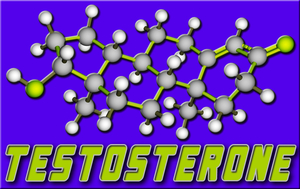Introduction
Testosterone deficiency syndrome (TDS), also known as hypogonadism, is a clinical condition characterized by low levels of testosterone in the blood. This hormonal imbalance can have widespread effects on the body, including significant impacts on urinary health. This article delves into the relationship between testosterone deficiency and urinary health, with a specific focus on American men.
Understanding Testosterone Deficiency Syndrome
Testosterone is a crucial hormone in men, responsible for regulating various physiological functions, including muscle mass, bone density, and sexual health. When testosterone levels drop below normal, men may experience symptoms such as decreased libido, erectile dysfunction, fatigue, and mood changes. TDS can be caused by a variety of factors, including aging, obesity, and certain medical conditions.
Impact on Urinary Health
One of the less discussed but significant effects of testosterone deficiency is its impact on urinary health. Research has shown that men with low testosterone levels are more likely to experience urinary symptoms such as frequent urination, urgency, and nocturia (waking up at night to urinate). These symptoms can significantly affect the quality of life and may be indicative of underlying conditions such as benign prostatic hyperplasia (BPH) or lower urinary tract symptoms (LUTS).
The Role of Testosterone in Prostate Health
The prostate gland, a key component of the male reproductive system, is influenced by testosterone levels. While testosterone itself does not cause prostate enlargement, the hormone can convert to dihydrotestosterone (DHT), which is linked to the development of BPH. Men with TDS may still experience BPH due to the complex interplay of hormones and other factors. Therefore, maintaining optimal testosterone levels is essential for prostate health and overall urinary function.
Clinical Studies and Findings
Several studies have explored the connection between testosterone deficiency and urinary health. A study published in the *Journal of Urology* found that men with lower testosterone levels were more likely to report severe urinary symptoms compared to those with normal levels. Another study in the *European Urology* journal suggested that testosterone replacement therapy (TRT) could improve urinary symptoms in men with TDS, although more research is needed to fully understand the benefits and risks.
Testosterone Replacement Therapy and Urinary Health
TRT is a common treatment for men with TDS, aimed at restoring testosterone levels to normal. While TRT can improve many symptoms associated with low testosterone, its impact on urinary health is still under investigation. Some men report improvements in urinary symptoms after starting TRT, but others may not experience significant changes. It is crucial for men considering TRT to consult with a healthcare provider to weigh the potential benefits against the risks.
Lifestyle and Preventive Measures
In addition to medical treatments, lifestyle modifications can play a significant role in managing TDS and improving urinary health. Regular exercise, a balanced diet, and maintaining a healthy weight can help boost testosterone levels naturally. Additionally, avoiding excessive alcohol consumption and quitting smoking can contribute to better overall health and may reduce the risk of urinary issues.
Conclusion
Testosterone deficiency syndrome is a multifaceted condition that can significantly impact urinary health in American men. Understanding the link between low testosterone levels and urinary symptoms is crucial for effective management and treatment. While testosterone replacement therapy may offer relief for some, a holistic approach that includes lifestyle changes is essential for maintaining optimal urinary health. Men experiencing symptoms of TDS should seek medical advice to explore the best treatment options tailored to their individual needs.
Contact Us Today For A Free Consultation

- Understanding Testosterone Deficiency: Symptoms, Diagnosis, and Management in American Men [Last Updated On: February 20th, 2025] [Originally Added On: February 20th, 2025]
- Stress-Induced Testosterone Decline in American Males: Causes and Management Strategies [Last Updated On: March 16th, 2025] [Originally Added On: March 16th, 2025]
- Testosterone Deficiency Syndrome: Hormone Therapy Benefits and Holistic Management for American Males [Last Updated On: March 19th, 2025] [Originally Added On: March 19th, 2025]
- Testosterone Deficiency in American Men: Symptoms, Diagnosis, and Energy-Boosting Treatments [Last Updated On: March 20th, 2025] [Originally Added On: March 20th, 2025]
- Testosterone Deficiency in American Men: Impacts on Mood and Mental Health [Last Updated On: March 20th, 2025] [Originally Added On: March 20th, 2025]
- Testosterone Deficiency Syndrome: Impact, Diagnosis, and Management in Aging American Men [Last Updated On: March 20th, 2025] [Originally Added On: March 20th, 2025]
- Environmental Toxins Linked to Rising Testosterone Deficiency in U.S. Males [Last Updated On: March 20th, 2025] [Originally Added On: March 20th, 2025]
- Testosterone Deficiency in American Men: Impacts on Muscle Mass and Treatment Strategies [Last Updated On: March 20th, 2025] [Originally Added On: March 20th, 2025]
- Testosterone Deficiency Syndrome: Impacts on Prostate Health and Management Strategies [Last Updated On: March 21st, 2025] [Originally Added On: March 21st, 2025]
- Testosterone Deficiency Syndrome: Importance of Regular Monitoring and Management in American Men [Last Updated On: March 21st, 2025] [Originally Added On: March 21st, 2025]
- Smoking's Impact on Testosterone Levels and TDS Risk in American Males [Last Updated On: March 21st, 2025] [Originally Added On: March 21st, 2025]
- Vitamin D's Role in Managing Testosterone Deficiency in American Males [Last Updated On: March 22nd, 2025] [Originally Added On: March 22nd, 2025]
- Chronic Illnesses and Their Impact on Testosterone Deficiency in American Males [Last Updated On: March 22nd, 2025] [Originally Added On: March 22nd, 2025]
- Alcohol's Impact on Testosterone and Risk of TDS in American Males [Last Updated On: March 22nd, 2025] [Originally Added On: March 22nd, 2025]
- Zinc's Vital Role in Combating Testosterone Deficiency in American Men [Last Updated On: March 22nd, 2025] [Originally Added On: March 22nd, 2025]
- Magnesium's Role in Managing Testosterone Deficiency Syndrome in American Males [Last Updated On: March 22nd, 2025] [Originally Added On: March 22nd, 2025]
- Testosterone Deficiency Syndrome: Understanding Its Impact on Hair Loss in Men [Last Updated On: March 23rd, 2025] [Originally Added On: March 23rd, 2025]
- Testosterone Deficiency Syndrome: Impacts on Immune Function in American Men [Last Updated On: March 23rd, 2025] [Originally Added On: March 23rd, 2025]
- Testosterone Deficiency and Cognitive Decline in American Men: Impacts and Interventions [Last Updated On: March 23rd, 2025] [Originally Added On: March 23rd, 2025]
- Testosterone Deficiency Impacts Muscle, Fat, and Bone Health in American Males [Last Updated On: March 23rd, 2025] [Originally Added On: March 23rd, 2025]
- Testosterone Deficiency in American Men: Impacts on Libido and Holistic Management [Last Updated On: March 23rd, 2025] [Originally Added On: March 23rd, 2025]
- Omega-3 Fatty Acids: A Promising Approach to Managing Testosterone Deficiency in Men [Last Updated On: March 23rd, 2025] [Originally Added On: March 23rd, 2025]
- Soy Consumption and Testosterone Levels in American Men with TDS: A Comprehensive Review [Last Updated On: March 23rd, 2025] [Originally Added On: March 23rd, 2025]
- Testosterone Deficiency and Depression: Exploring the Link in American Men [Last Updated On: March 23rd, 2025] [Originally Added On: March 23rd, 2025]
- Ashwagandha: A Natural Remedy for Testosterone Deficiency in American Males [Last Updated On: March 24th, 2025] [Originally Added On: March 24th, 2025]
- Shift Work's Impact on Testosterone Levels in American Males: A Growing Concern [Last Updated On: March 24th, 2025] [Originally Added On: March 24th, 2025]
- Testosterone Deficiency Syndrome: Impacts on Skin Health and Management Strategies [Last Updated On: March 24th, 2025] [Originally Added On: March 24th, 2025]
- Blue Light Exposure Linked to Testosterone Deficiency in American Men: Mitigation Strategies [Last Updated On: March 24th, 2025] [Originally Added On: March 24th, 2025]
- Testosterone Deficiency and Sleep Apnea: A Bidirectional Health Concern for American Males [Last Updated On: March 25th, 2025] [Originally Added On: March 25th, 2025]
- Testosterone Deficiency and Anemia: Understanding Links and Managing Health in American Males [Last Updated On: March 25th, 2025] [Originally Added On: March 25th, 2025]
- Weight Training Boosts Testosterone: A Solution for American Men with TDS [Last Updated On: March 25th, 2025] [Originally Added On: March 25th, 2025]
- Testosterone Deficiency and Joint Health in American Males: Impacts and Management Strategies [Last Updated On: March 25th, 2025] [Originally Added On: March 25th, 2025]
- Testosterone Deficiency in American Male Athletes: Symptoms, Impact, and Management Strategies [Last Updated On: March 25th, 2025] [Originally Added On: March 25th, 2025]
- Testosterone Deficiency in American Men: Impacts on Dental Health and Management Strategies [Last Updated On: March 25th, 2025] [Originally Added On: March 25th, 2025]
- Air Pollution's Impact on Testosterone Levels and TDS in American Males [Last Updated On: March 26th, 2025] [Originally Added On: March 26th, 2025]
- Boron Supplementation: A Promising Approach to Managing Testosterone Deficiency in American Males [Last Updated On: March 26th, 2025] [Originally Added On: March 26th, 2025]
- Testosterone Deficiency Syndrome: Impacts on Vision Health in American Men [Last Updated On: March 26th, 2025] [Originally Added On: March 26th, 2025]
- Pesticide Exposure Linked to Testosterone Deficiency in American Men: Risks and Reduction Strategies [Last Updated On: March 26th, 2025] [Originally Added On: March 26th, 2025]
- Diet Soda Consumption Linked to Lower Testosterone Levels in American Men [Last Updated On: March 26th, 2025] [Originally Added On: March 26th, 2025]
- EMF Exposure and Testosterone Levels: Implications for TDS in American Males [Last Updated On: March 27th, 2025] [Originally Added On: March 27th, 2025]
- Chronic Stress and Testosterone Deficiency in American Males: Impacts and Management [Last Updated On: March 27th, 2025] [Originally Added On: March 27th, 2025]
- High-Fat Diets and Testosterone: Impacts and Dietary Strategies for American Males [Last Updated On: March 27th, 2025] [Originally Added On: March 27th, 2025]
- Testosterone Deficiency Syndrome: Impacts on Liver Health in American Males [Last Updated On: March 27th, 2025] [Originally Added On: March 27th, 2025]
- Testosterone Deficiency Linked to Pancreatic Health Issues in American Men [Last Updated On: March 27th, 2025] [Originally Added On: March 27th, 2025]
- Testosterone Deficiency Linked to Hearing Loss in American Males: Insights and Implications [Last Updated On: March 27th, 2025] [Originally Added On: March 27th, 2025]
- Testosterone Deficiency in American Males: Impacts on Memory and Cognitive Health [Last Updated On: March 27th, 2025] [Originally Added On: March 27th, 2025]
- Heavy Metal Exposure and Testosterone Deficiency in American Men: Impacts and Mitigation [Last Updated On: March 27th, 2025] [Originally Added On: March 27th, 2025]
- Testosterone Deficiency Syndrome: Impacts on Kidney Function and Holistic Management Strategies [Last Updated On: March 28th, 2025] [Originally Added On: March 28th, 2025]
- Plasticizers Linked to Testosterone Deficiency in American Men: Emerging Research and Risks [Last Updated On: March 28th, 2025] [Originally Added On: March 28th, 2025]
- Testosterone Deficiency and Adrenal Health: A Holistic Approach for American Males [Last Updated On: March 29th, 2025] [Originally Added On: March 29th, 2025]
- Testosterone Deficiency and Thyroid Health: Interconnections and Management Strategies [Last Updated On: March 29th, 2025] [Originally Added On: March 29th, 2025]
- Fenugreek: A Natural Solution for Testosterone Deficiency in American Males [Last Updated On: March 30th, 2025] [Originally Added On: March 30th, 2025]
- Testosterone Deficiency Linked to Increased Gallbladder Disease Risk in American Males [Last Updated On: March 31st, 2025] [Originally Added On: March 31st, 2025]
- Noise Pollution Linked to Testosterone Deficiency in American Males: A Growing Concern [Last Updated On: April 1st, 2025] [Originally Added On: April 1st, 2025]
- Testosterone Deficiency Syndrome in American Men: Pituitary Role, Symptoms, and Management [Last Updated On: April 1st, 2025] [Originally Added On: April 1st, 2025]
- Tribulus Terrestris: A Promising Aid for Testosterone Deficiency in American Men [Last Updated On: April 4th, 2025] [Originally Added On: April 4th, 2025]
- Testosterone Deficiency Syndrome: Impact, Diagnosis, and Treatment in American Men [Last Updated On: April 5th, 2025] [Originally Added On: April 5th, 2025]
- Fluoride Exposure and Testosterone Levels in American Men: A Potential Link Explored [Last Updated On: April 6th, 2025] [Originally Added On: April 6th, 2025]
- Testosterone Deficiency and Pineal Gland: Impacts and Strategies for American Males [Last Updated On: April 7th, 2025] [Originally Added On: April 7th, 2025]
- DHEA Supplementation: A Promising Approach to Managing Testosterone Deficiency in American Males [Last Updated On: April 9th, 2025] [Originally Added On: April 9th, 2025]
- Testosterone Deficiency Syndrome: Impacts on Parathyroid Health and Holistic Management [Last Updated On: April 10th, 2025] [Originally Added On: April 10th, 2025]
- Phthalates Exposure Linked to Testosterone Deficiency in American Males: A Public Health Concern [Last Updated On: April 10th, 2025] [Originally Added On: April 10th, 2025]
- Testosterone Deficiency in American Males: Impacts on Respiratory Health and COPD [Last Updated On: April 11th, 2025] [Originally Added On: April 11th, 2025]
- Bisphenol A Exposure Linked to Testosterone Deficiency in American Men [Last Updated On: April 11th, 2025] [Originally Added On: April 11th, 2025]
- Ginseng's Potential in Managing Testosterone Deficiency in American Males [Last Updated On: April 11th, 2025] [Originally Added On: April 11th, 2025]
- PFC Exposure Linked to Testosterone Deficiency in American Males: A Public Health Concern [Last Updated On: April 12th, 2025] [Originally Added On: April 12th, 2025]
- Testosterone Deficiency Syndrome: Gastrointestinal Impacts and Management in American Males [Last Updated On: April 13th, 2025] [Originally Added On: April 13th, 2025]
Word Count: 568





















